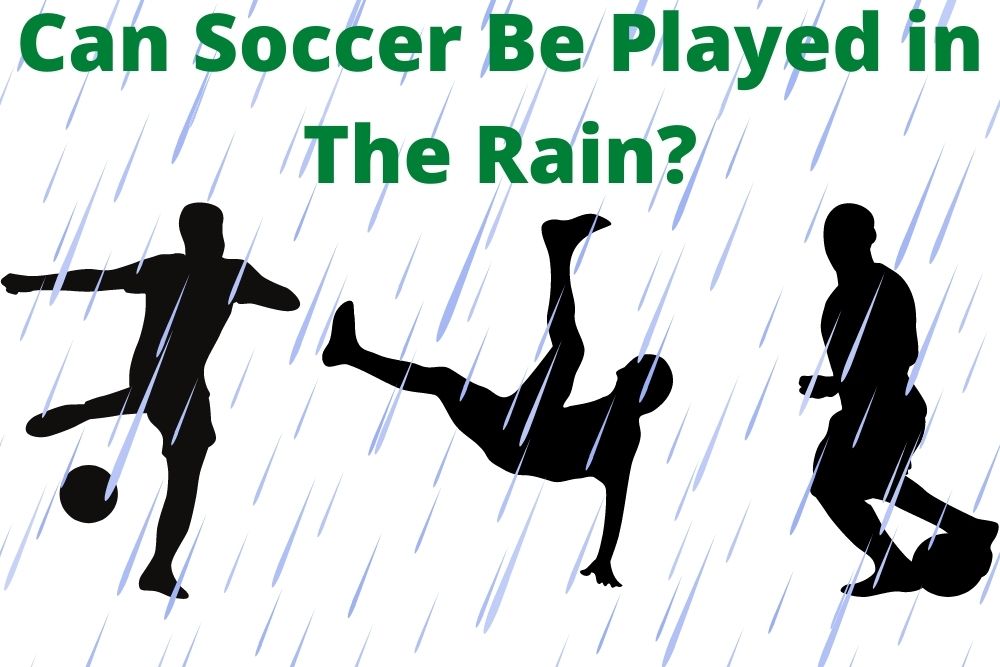Soccer is one of the dynamic games that go ahead almost all year round. Most leagues around the world usually start around July or August and end in May.
This means that part of the leagues has to be played in the wet weather. While no professional soccer player trains to play in the rain, the weather sometimes defies all the predictions.
Indoor soccer usually has no problem with rain. They are played in enclosures with roofs that prevent the rain from gaining entry into the stadium.
Therefore, indoor soccer players will remain dry and their pitch will not be affected even if it rains. On the other hand, outdoor soccer players like association football players and beach soccer players feel every impact of rainy weather.
From getting wet to fighting the cold to soggy pitches that prevent the ball from bouncing, there is just so much that the beach soccer players have to contend with when playing in the rain.
Soccer players work harder to maintain their balance in the rain as the turf becomes slippery. The condition of the turf can become unsafe for the soccer players—and the players can hurt themselves.
Playing in the rain is not only uncomfortable but it can also lower the soccer player’s performance as well as increase the risk of injuries like slip and fall or ankle twists.
Unless there is lightning, the referees in outdoor soccer will rarely end the game because of rain—even when it has drastically changed the nature of the field.
When it comes to rain, the decision is subjective and left to the referee’s discretion compared to other weather. The referee can stop the game if he or she feels the rain is too much and the safety of the players is threatened.
But, how much rain is too much? In this post, we are going to look at all you need to know when it comes to playing soccer in the rain including when you should and when you should not, and how to stay safe when playing in the rain.
Quick Navigation
Can soccer be played in the rain?
Rain can come with lightning and thunderstorm and an open soccer field is one of the most dangerous places to be when there is lightning or thunderstorm. In July 2020, a 16-year-old soccer player was struck by lightning as he attempted to kick the ball into the goalpost.
While the teen survived with only a small burn on his chest where he was wearing a chain, other soccer players have not been so lucky. In 1998, an entire soccer team in the Democratic Republic of Congo was killed by lightning while 30 spectators were also injured.
In other words, while it is possible to play soccer in the rain, things can get really ugly if there is lightning or thunderstorm. Therefore, the referee must always prioritize the safety of the soccer players and end the game whenever the rain poses a threat to the health of the soccer players.
In the National Collegiate Athletic Association (NCAA), if any of the officials detect lightning, the game will be delayed for a minimum of 30 minutes. “Rainout” (a term used for cancelation due to rain) can be declared if the lightning persists for a certain duration.
Rain can affect the ball, the pitch, and the players in different ways. Below are some of the ways that rain can impact a soccer game.
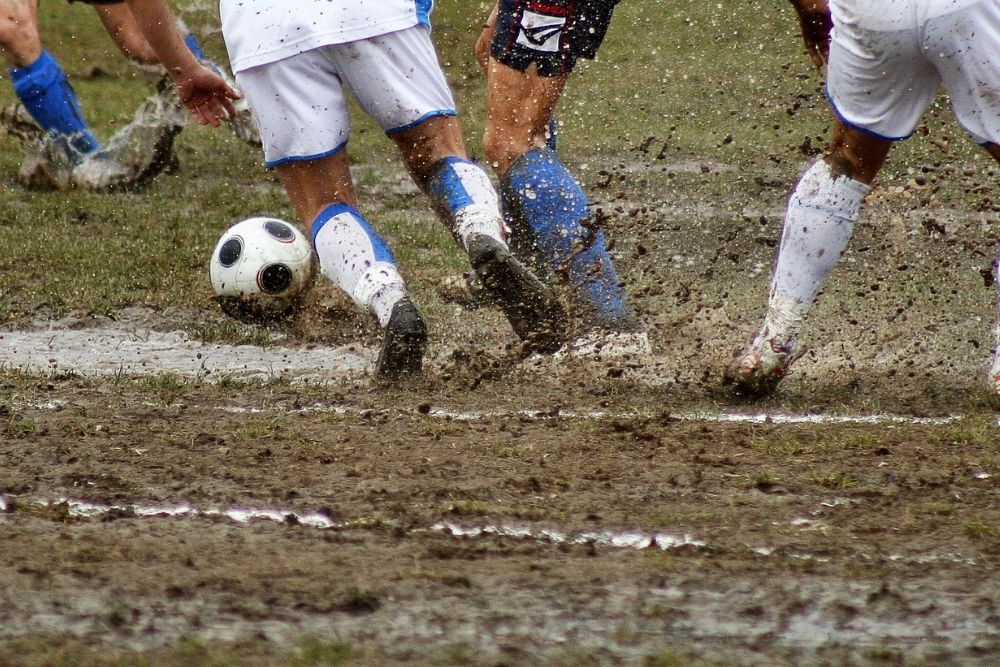
- Makes the ball slicker
When it rains, the ball becomes slicker and more slippery and this can lead to miskicks, incomplete passes, and sloppy catches. While the effect of a slick ball can be worse on the goalkeeper, the soccer players are not immune too.
Catching a slick ball is harder for the goalkeeper than catching a dry ball. Even when the goalkeeper has perfectly timed the catch, the ball can slip from their grip and an opposing player can capitalize on the error to score.
Therefore, good goalkeepers will prefer to punch the ball than attempt to catch it when they know that it is sleek. Goalkeepers can counter the effect of a slippery ball by wearing special gloves that will elevate the grip on the ball.
Soccer players also have a hard time throwing the ball when it is slick. That explains why you will sometimes see a soccer player cleaning the ball with his or her jersey—especially when they want to execute a long throw.
Also, rain can make it harder to control the ball when heading, chesting, or trapping. The ball will easily graze off your body and land where you don’t want them to.
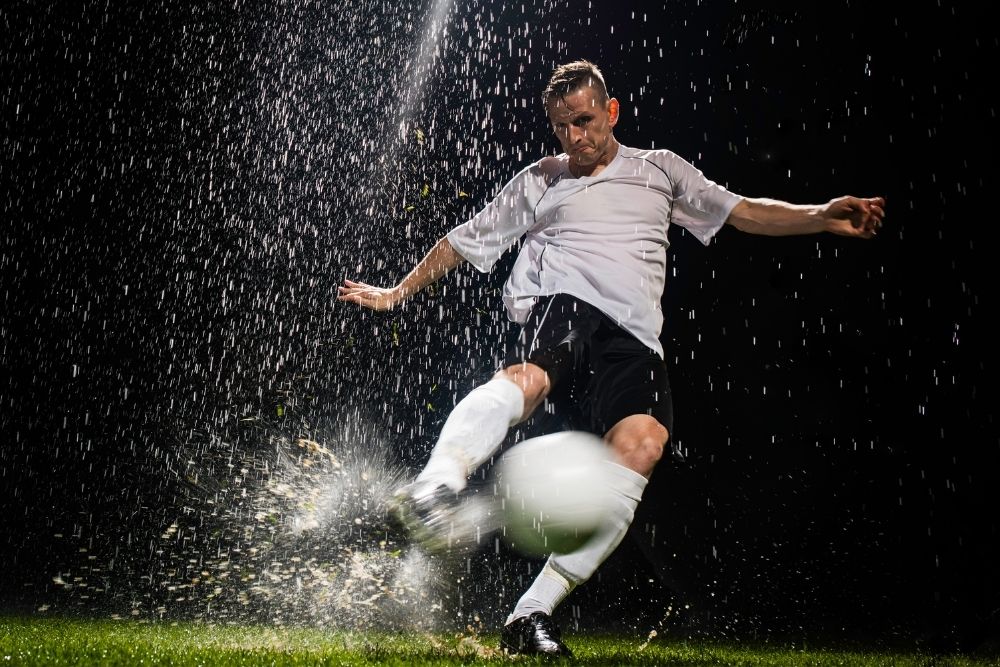
- Pitch can become soggy
One of the few times that a soccer game has been called off because of rain was in 2012 during a qualifier between England and Poland. The officials judged the Warsaw pitch as unplayable following a heavy downpour.
Soggy pitches are harder to play on because the water will always hold back the ball no matter how hard you kick. The resistance from the waterlogged pitch can also make it harder for soccer players to run or cause them to exert more energy than they normally should.
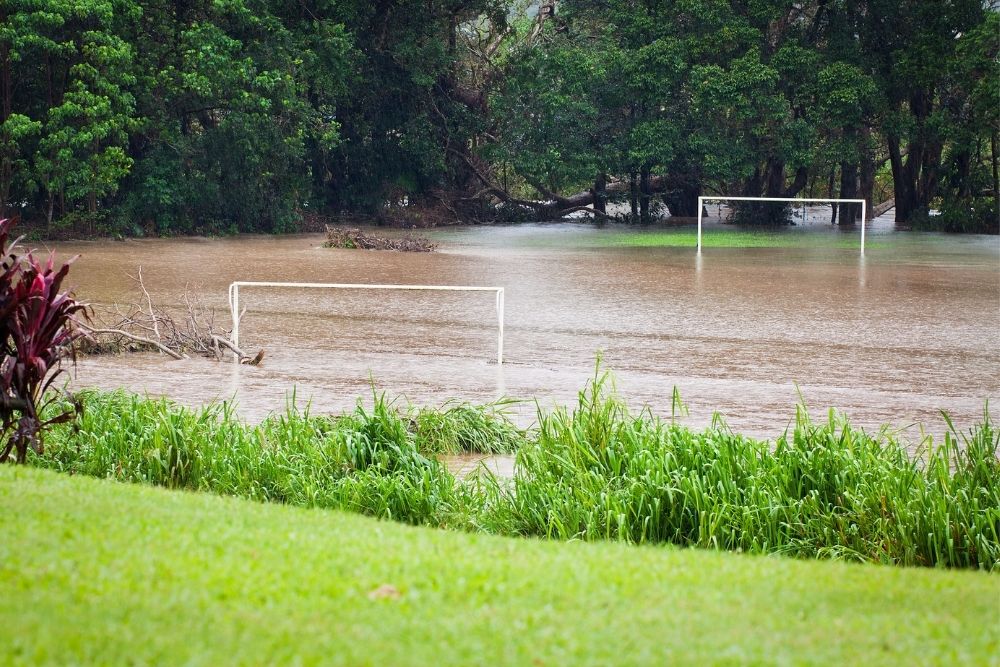
Also, there are some actions that will not work when you are playing on a soggy pitch. For example, slide tackle is a no-no. Likewise, heading the ball down to beat the goalkeeper will not work because the ball will fail to bounce.
A ground or carpet shot will not go far as it will be trapped in the pool of water. The best way to keep the ball moving on a soggy pitch is to always keep it in the air.
Ultimately, soccer players will get tired and frustrated quicker when playing on soggy pitches. Natural turfs are usually more affected by rain as it creates sinkholes, muddy areas, and puddles on the pitch. Generally, artificial turfs have numerous advantages over natural turfs when it rains.
Most artificial turfs have tiny drains that allow the water to go out without overly affecting the nature of the soccer pitch. Nevertheless, the slippery nature of artificial turfs can make the ball become too fast.
When this happens, balls can outrun the player making it harder to complete a counterattack. Also, due to their slippery nature, chances of slip and fall injuries are higher among soccer players.
Soccer players can counter the effect of a waterlogged or slippery pitch by wearing cleats designed for such conditions – Soft Ground (SG) cleats.
- 10mm foam cushioning in collar for comfort
- Replaceable screw-in studs
- Hybrid8 plate outsole provides lightweight traction
Last update on 2023-11-11 / Affiliate links / Images from Amazon Product Advertising API
- Limited visibility
The heavier the downpour, the harder it will be for both the soccer player and the goalkeeper to see the ball because they will have to struggle with keeping their eyes open.
For example, goalkeepers need to keep their eyes open to perfect time and catch a shot. However, it will be hard for them to do that when there is poor visibility—any swerve on the ball can be missed by the goalkeeper thereby increasing the opponent’s chances of scoring a goal.
Dwindling visibility can put more pressure on the goalies which will also add to their worsening performance. However, it is not all bad news for goalies.
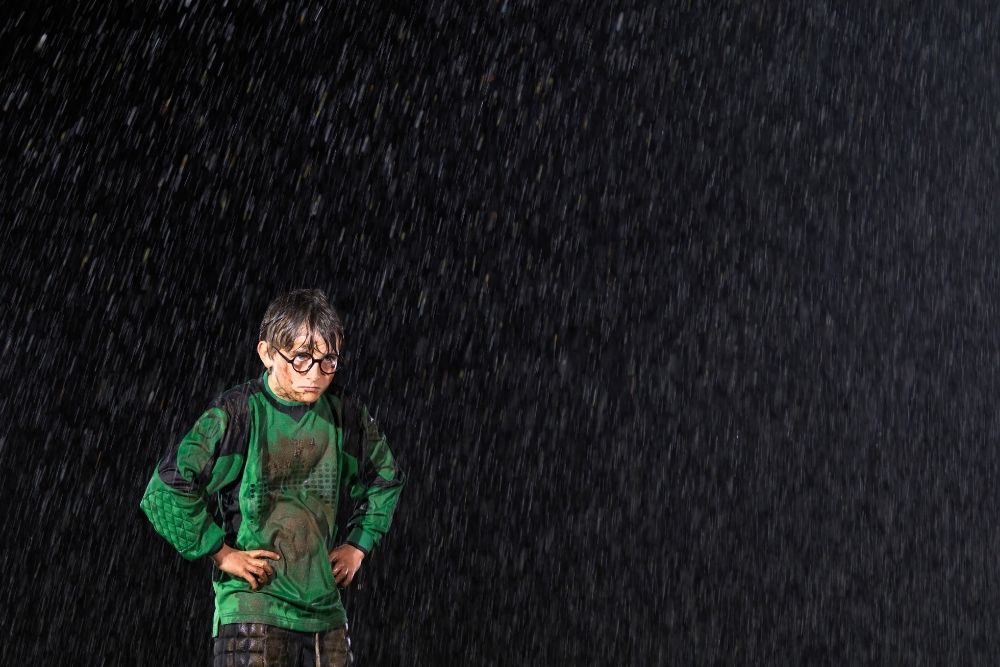
It is always harder for goalies to go down and catch carpet shorts than those that have been given some elevation. When the pitch is waterlogged, ground shots will almost come to a halt before reaching the goalkeeper making it easier for them to catch the ball.
Fans also suffer when it rains because the limited visibility can affect what they can see. Fans with health challenges may be forced to leave the stadium safer areas.
- Lower immunity
Cold weather leads to lower immunity. Also, when rain strikes natural turf, it causes microorganisms that are on the soil to become airborne.
A combination of lower immunity and microorganisms becoming airborne increases the chance of infection for soccer players when it rains. Therefore, for a soccer player with any health challenge, playing soccer in the rain can be a really bad idea.
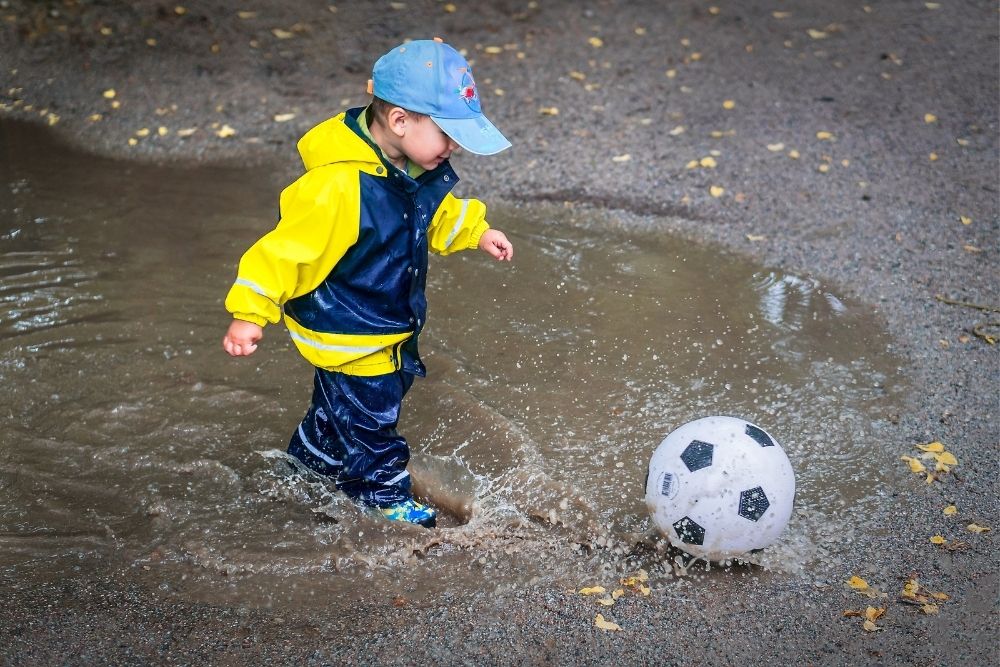
Does soccer stop for rain?
Crowd safety, floodlights issues, on-field confrontations, and injuries are some of the factors that can lead to the stoppage of a game but rain is usually not one of them.
Soccer is one of the most weather-resistant outdoor games unlike other outdoor games like golf, baseball, tennis, and cricket which will easily be called off whenever rain starts falling. The game will continue as scheduled if rain begins to fall before or during the game.
Soccer will only stop when there is lightning or thunderstorm because of the risk it poses to soccer players. According to records, lightning kills more people than tornadoes each year.
Interestingly, lightning can strike 10 miles away from the area that is experiencing rainfall. Once any of the match officials detect lightning, with or without rain, the game can be paused.
Inasmuch as most stadiums have state-of-the-art drainage systems, soccer can stop if rainfall leads to flooding. Even when there is no lightning, the referee can end the game if the pitch becomes unplayable.
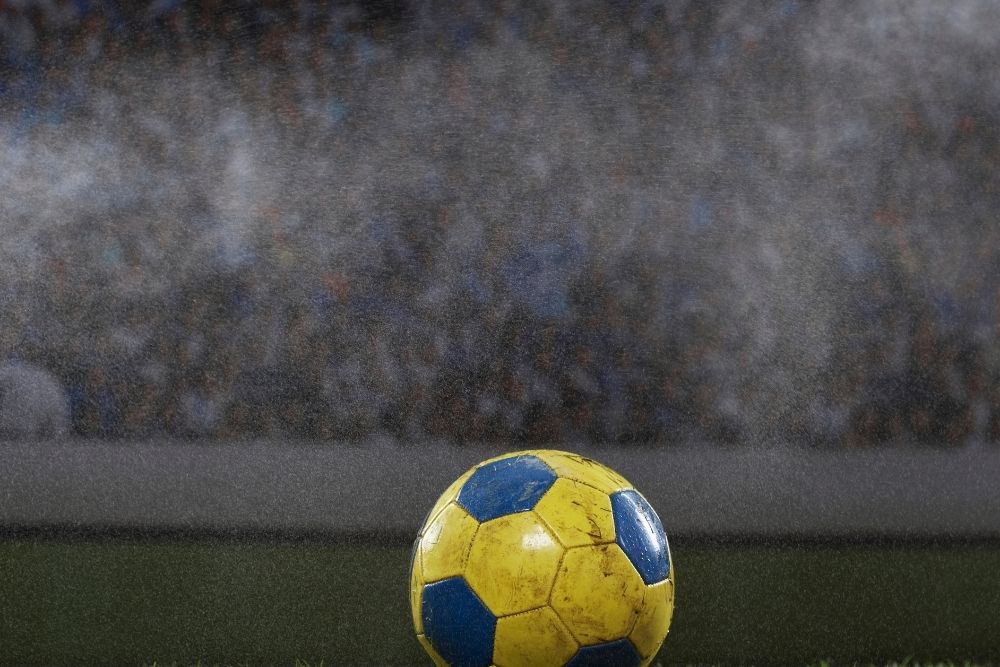
In street soccer, the laws are a little relaxed too. Most children and teens will not mind playing soccer in the rain except for those that have been warned by their parents never to do so.
Another reason why soccer will stop or pause is if the rain becomes so heavy that it impedes the vision of the players or the pitch becomes waterlogged and makes playing dangerous.
Each national association or league has regulations on what happens when a soccer game is stopped, paused, or abandoned. Usually, one of three things will happen namely;
The game can be replayed at a later date if it was abandoned due to an unsafe field before it started
If 50 minutes of the game has been played, for example, it can be rescheduled at a later date with the clock starting at the 50-minute mark
In some leagues or associations, once over 60 minutes has been played, the result is valid and the game will not be rescheduled
If the rain becomes too heavy during a soccer game, the match officials can pause the game periodically to see if the intensity of the rain will reduce. In one incident in the MLS, the game was delayed for over 3 hours by the officials until the rain’s intensity reduced.
Is playing soccer in the rain bad?
It is possible to play soccer in the rain and in other harsh conditions. Unless you have a health condition that will get worse when you become cold, playing soccer in the rain should not pose any trouble at all.
However, playing soccer in the rain can limit your performance, especially if the field has become waterlogged. Things can get really bad if the rain becomes too heavy making visibility poor or when there is lightning.
Playing soccer in the rain can increase the potential of a soccer player to become injured. The reason is that it is harder to time your tackles and the slippery nature of the field will make it easier for a soccer player to fall.
Playing soccer in the rain comes with a lot of challenges but you can overcome some of these challenges by making a few changes to your playing style. Below are some of the ways you can safely play soccer in the rain.
1. Think before you tackle
You can easily lose control when you slide on wet turf. Therefore, properly evaluate if there is an obstacle in front of you before diving on the floor.
Bear in mind that that ball can quickly move away on a slick turf. So, time your tackle properly so that you don’t hurt the player and possibly be ejected from the game.
2. Dress properly
Wearing compression shorts and sleeves can stimulate the flow of blood leading to muscle optimization. Investing in grip socks will also help to improve your stability on wet turf.
Apart from compression sleeves and shorts, you also need a good pair of grippy cleats to prevent slip and fall accidents. Certain types of soccer cleats specifically for wet surfaces – soft ground (SG) – should be used to ensure the best game performance.
In a non-professional setting like street soccer, the players can wear raincoats to prevent them from getting wet or cold.
Last update on 2023-05-08 / Affiliate links / Images from Amazon Product Advertising API
Conclusion
Although soccer can be played in the rain, you always have to think of safety first. Playing too long under the rain can increase your chance of becoming sick.
Therefore, it is important to know how far you push your limit to avoid putting yourself in danger. Also, when playing soccer in the rain you may have to tweak your tactics in order to perform near-optimal.
If the stadium is waterlogged from rain, one of the most important tricks to improve your performance is to give the ball some elevation whenever you want to play a shot.
Avoid shooting the ball towards puddles or it will get stuck. Also, when playing soccer in the rain, don’t try to play fancy.
The direction of movement of soccer balls in waterlogged turf is unpredictable and this will definitely work against you if you try to dribble. You should save your fancy skills for another day.
Hi there, I’m Jay.
Soccer is everything in my life! My friends and I have created this blog with all our enthusiasm, passion, and understanding after years of playing pro soccer. Hope you will enjoy it!
